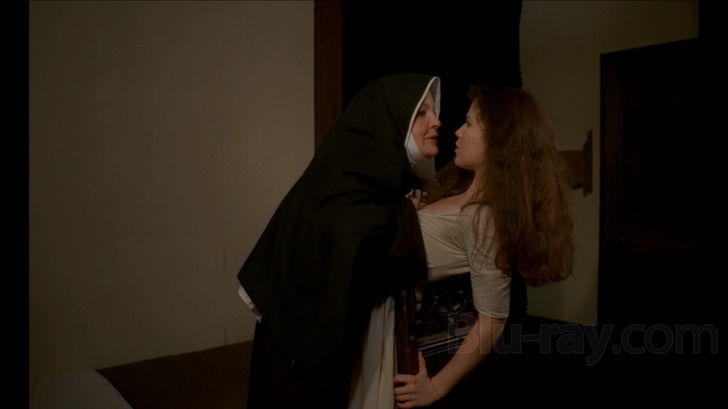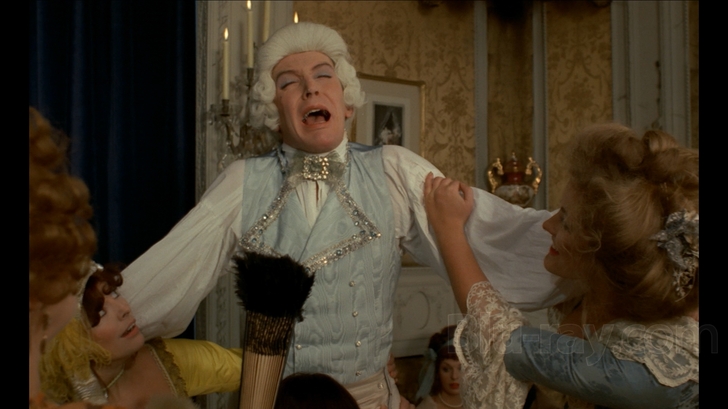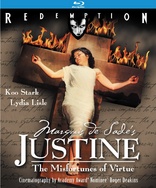Marquis de Sade's Justine Blu-ray Movie
HomeMarquis de Sade's Justine Blu-ray Movie 
The Misfortunes of Virtue / Cruel PassionRedemption | 1977 | 97 min | Not rated | Apr 24, 2012
Movie rating
6 | / 10 |
Blu-ray rating
| Users | 3.5 | |
| Reviewer | 2.5 | |
| Overall | 3.0 |
Overview
Marquis de Sade's Justine (1977)
Justine is a nubile young virgin cast out of a French orphanage and thrust into a depraved world of prostitution, predatory lesbians, a fugitive murderess, bondage, branding, and one supremely sadistic monk. It's a twisted tale of strange desires, perverse pleasures and the ultimate corruption of innocence as told by the Marquis de Sade.
Starring: Koo Stark, Martin Potter, Lydia Lisle, Katherine Kath, Hope JackmanDirector: Chris Boger
| Erotic | Uncertain |
| Drama | Uncertain |
Specifications
Video
Video codec: MPEG-4 AVC
Video resolution: 1080p
Aspect ratio: 1.64:1
Original aspect ratio: 1.66:1
Audio
English: LPCM 2.0
Subtitles
None
Discs
50GB Blu-ray Disc
Single disc (1 BD)
Playback
Region A, B (C untested)
Review
Rating summary
| Movie | 2.5 | |
| Video | 3.5 | |
| Audio | 3.0 | |
| Extras | 2.5 | |
| Overall | 2.5 |
Marquis de Sade's Justine Blu-ray Movie Review
How can something so depraved be so dull?
Reviewed by Casey Broadwater April 4, 2012The work of famed literary kinkster the Marquis de Sade has been endlessly adapted for the screen, from full-on XXX fare to decidedly more mainstream material, like 2000's Quills. Most of the film adaptations fall somewhere in between, titillating with disturbing, often rape-y erotica while also attempting some measure of respectability by playing up the more intellectual side of Sade's do-what-thou-wilt philosophy. The most infamous example, of course--and arguably the best cinematic take on Sade's work--is Pier Paolo Pasolini's Sal˛, which restaged the unfinished novel 120 Days of Sodom in fascist-era Italy. But perhaps the most widely adapted of Sade's books is Justine, a story of two sisters--one chaste, one self-consciously lascivious--who are forced to fend for themselves in a world ruled by base desires. Notorious Spanish director Jes˙s Franco--who has made no less than ten Sade-inspired films--told his version of the tale in 1969, and low-rent filmmakers Claude Pierson and Mac Ahlberg each had a go at the story in 1972 and '75, respectively. So, no, the world probably didn't need yet another version in 1977 by way of Chris Bogen, whose mostly forgettable Justine (a.k.a. Cruel Passions) would be his first and last film. It does have two things going for it, though: 1.) It stars gorgeous one-time it-girl Koo Stark, whose personal relationships eventually overwhelmed her nascent film career, and 2.) it was the first film credit for famed British cinematographer Roger Deakins, now known best for shooting most of the Coen brothers' movies.

Justine...
The story opens with good-girl Justine (Stark) and her no-good elder sister Juliette (Lidia Lisle) attending the funeral of their father--who hung himself- -and mother, who subsequently died of a broken heart. Because of the sin of suicide, the girls' parents are being buried on unconsecrated ground, and according to the attendant nuns and priest, they'll surely burn in hellfire for all eternity. This cheery thought spurs Justine's brain on to the first of two hallucinogenic dream sequences in the film, imagining her father's coffin bursting into flames. Back at the convent where they're being not-so- charitably housed, the two girls deal with their religious semi-imprisonment in their own ways. Juliette strips naked and fondles herself in bed, intentionally tormenting Sister Claire (Malou Cartwright), who looks on, praying feverishly to resist her sapphic urges. Meanwhile, the ever-pious Justine tries to remain pure, even as she's subjected to the lecherous advances of the Mother Superior (Maggie Peterson). Yes, the first act of Justine falls squarely into the nunsploitation genre. Hypocrisy rears its ugly head. Pent-up sexual aggression is unloosed. Habits and wimples most definitely are shed. The Marquis de Sade was writing about lesbian nuns almost two hundred years before the subject became standard-issue grindhouse circuit stuff in the 1970s. His hedonistic point was that nature--not the Church or government or polite society--is the ultimate ruler of mankind, and that there's no use repressing desire since pleasure is essentially the singular goal of human life.
Forced out of the nunnery, Justine and Juliette set off for London, where Juliette is convinced they can find work as prostitutes and get rich selling their virginities to the highest bidder. (For all her talk, Juliette has yet to do the deed.) She has ready Sadean justifications for this plan, telling Justine to "seek out depravity," for "if we cannot hope to be protected by love, we can at least enjoy it." They land at a den of debauchery run by the free-spirited Madame Laronde (Katherine Kath), who's full of carnal wisdom of her own--"If nature had intended us to be modest, we shouldn't have been born naked"--and sets about schooling the girls in the erotic arts. She has help from the brothel's resident fop (Barry McGinn, with manic glee), a powder- wigged, whip-wielding dandy who snorts coke out of a cane and goes into fits of orgasmic giggles at the slightest touch. These scenes at the brothel are the film's best, perversely funny and filled with references to Sade's philosophy, like Madame Laronde's assertion that "religion is an illness...to be cured!"
An atheist and bisexual libertine, Sade was clearly no fan of the Church--the feeling, it goes without saying, was mutual--and this adaptation of Justine sticks it rather hard to the clergy, who are presented without exception as disingenuously pious and so racked by the contradictions between their innate sexuality and their faith that they've been warped into sex-obsessed monsters. (Sade clearly wouldn't've been surprised by the recent child abuse scandals.) When Justine flees the brothel--after Juliette's "honor" has been purchased by the dashing Lord Carlisle (Martin Potter)-- she returns to her only supposed ally, Pastor John (Louis Ife), who takes her into his home with bad intentions that become ever more obvious as the evening goes on. "We would often feel ashamed of our kind actions if the world could see the motivations behind them," he says while showing her to her room, and sure enough, he's got rape on his mind. In the film's second dream sequence and most memorable scene, Justine envisions herself nailed to a burning cross while the zombified faces of priests and nuns glare down at her from a balcony. When she wakes up, Pastor John is frantically pawing at her.
It's a tense moment--and I won't reveal exactly what happens next--but it also marks the spot in the film where we begin to lose interest in Justine's plight. The problem isn't with Koo Stark, who gives an alluring--and quite often nude--performance, but with the way her character is written. Justine is defined solely by her virtue, and we rarely get any sense of struggle within her. Sure, she's beset by plenty of external difficulties--the novel was originally titled Les infortunes de la vertu, or, The Misfortunes of Virtue--but dramatically and psychologically speaking, she's a blank. And this, to put it harshly, is boring. It seems remiss that Justine doesn't suffer any of the same conflicted emotions toward her own sexuality that the priests and nuns do--she's unswervingly chaste, so much so that she doesn't feel humanly relatable.
This makes some sense allegorically--Justine, the absolute embodiment of goodness, is punished while her "wicked" sister reaps the rewards of selling her own virginity--but what may have worked on the pages of a philosophical novel doesn't stick as well to the screen. Justine just doesn't do much. In fact, for almost the entire film she's only being acted upon. She's beautiful and innocent and, therefore, every man who crosses her path wants to get into her pants. Repeat ad infinitum. It becomes routine. The remainder of the story finds Justine kidnapped by a gang of thieves and cutthroats and rapists who use her as bait for unsuspecting travelers, but even this isn't as interesting as it sounds. Although I give the film points for a suitably bleak and shocking climax--which I won't spoil--it's a case of too little too late. I'm not sure how a film so seemingly depraved--with sexually aggressive nuns, child murder, T&A galore, and even necrophilia--can ultimately be so ho-hum.
Marquis de Sade's Justine Blu-ray Movie, Video Quality 

For all it's narrative failings, Justine was at least capably and sometimes even beautifully shot by a straight-out-of-film-school Roger Deakins, who has gone on to work on much bigger and better projects, from The Shawshank Redemption to No Country for Old Men. Unfortunately, I doubt anyone is going to invest the money and time needed to give Justine a frame-by-frame restoration. The print used here, which is branded with the film's alternate title, Cruel Passion, is beset with the white and black specks, small scratches, and occasional brightness flickering of an oft-projected 35mm movie that's seen better days. Still, while they haven't done much restoration work, Kino and Redemption Films have at least presented the as-is print faithfully in high definition, with no apparent noise reduction or edge enhancement or other digital alterations. The 1080p/AVC-encoded transfer has a natural-looking grain structure, and while the picture is far from what anyone might call sharp, the film certainly benefits from its newfound resolution. Color also shows some age-related fluctuations, but in general the image is satisfyingly dense, with good contrast, black levels that don't crush much shadow detail, and hues that are strong without appearing oversaturated. Basically, the film looks much as you'd expect a film of this sort to look.
Marquis de Sade's Justine Blu-ray Movie, Audio Quality 

Ditto for the disc's Linear PCM 2.0 track, which does what it can with an original audio mix that probably wasn't too stunning to begin with. There are some light crackles, some slightly muffled voices, and the odd mild hiss here and there, but nothing that doesn't fall under the "it is what it is and there's not much that can be done about it" category. For the most part--aside from some brashness in the high end--this is a listenable-enough track. The dialogue may not have been recorded with the utmost fidelity, but it's always easy enough to understand, sitting fairly high in the mix. Effects are minimal, but the film does make occasional use of classical music cues, like Vivaldi's "Spring," and these sound fine. My only complaint--and this is a frequent one with Kino/Redemption titles--is that there are no subtitle options for those who might need or want them.
Marquis de Sade's Justine Blu-ray Movie, Special Features and Extras 

- Interviews (SD): The same interviews with director Chris Boger (5:31) and screenwriter Ian Cullen (19:23) ported over from the previous Redemption DVD.
- Alternate Title Sequences (1080p): Includes the English (00:25) and French (00:35) titles, both of which consist of black text against a greenish background.
- Theatrical Trailer (1080p, 2:30)
- Gallery (1080p): A user-directed gallery with 16 stills.
- Redemption Trailers (1080p): Includes trailers for The Nude Vampire, Fascination, Virgin Witch, Killer's Moon, and The Asphyx.
Marquis de Sade's Justine Blu-ray Movie, Overall Score and Recommendation 

Justine has moments of wild-eyed insanity and is home to some still-shocking Sadean philosophy--summed up in Juliette's observation that "the wicked will flourish and the good must flounder"--but it just doesn't work as a cohesive whole. The pacing is off, the plotting is too episodic, and the characters--especially Justine--feel underwritten. Still, the film has its lightly sleazy softcore charms if you're looking for 1970s-style nudity and nunsploitation. I judge not. Kino's Blu-ray release is a solid improvement over previous home video releases, but don't expect spectacular picture quality- -the film looks like the '70s low-budget erotic drama that it is. Recommended only for sadists, cinematic and otherwise.
Similar titles
Similar titles you might also like

Female Vampire
La comtesse noire
1973

Byzantium
2012

The Image
1975

Fleshpot on 42nd Street
The Girls of 42nd Street | Director's Cut
1973

Whore
Kino Cult #25
1991

Exorcism
L'Úventreur de Notre-Dame
1974

Vampire Ecstasy
The Devil's Playground
1973

Her Name Was Lisa
Standard Edition
1979

Private Vices, Public Virtues
Vizi privati, pubbliche virt¨
1976

Baby Rosemary
1976

Daughters of Darkness
Les lŔvres rouges | Remastered Special Edition | 4K Restoration
1971

Dracula A.D. 1972
1972

The Nude Vampire 4K
La vampire nue | Limited Edition | Indicator Series
1970

Kiss of the Damned
2012

Alice in Acidland
1969

Felicity
1978

Doriana Gray
Das Bildnis der Doriana Gray / Slipcover in Original Pressing
1976

Caligula
The Ultimate Cut + UK Cut
1979

Salon Kitty
Director's Cut | Madam Kitty
1976

A Climax of Blue Power
1974
